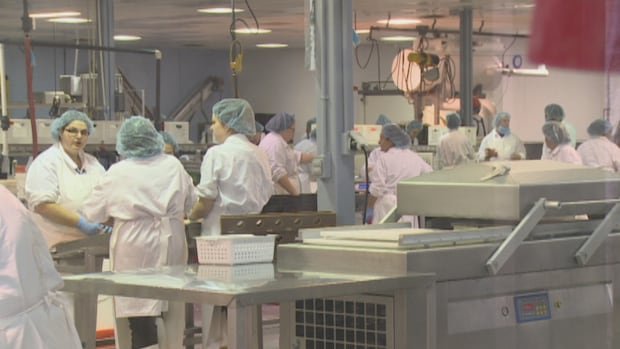Hundreds of temporary foreign workers in Prince Edward Island’s seafood processing industry have experienced reduced hours or layoffs this year due to Chinese tariffs on Canadian seafood, according to a group supporting these workers. The tariffs were imposed by China in retaliation for Canadian levies on Chinese steel, aluminum, and electric vehicles earlier this year.
The Prince Edward Island Seafood Processors Association attributed the slowdown in processing facilities to various factors, including the impact of the tariffs. Ryan MacRae, a program coordinator at the Cooper Institute, which advocates for migrant workers in the province, noted that over 200 seafood processing workers have been affected by the reduced workload.
MacRae highlighted a fundamental issue with Canada’s temporary foreign worker program, where workers are tied to a single employer through closed work permits, leaving them vulnerable in situations like production halts. He emphasized the financial strain on workers who still have expenses to cover despite the lack of income.
The seafood processing sector on the island heavily relies on migrant labor, with a significant increase in the number of temporary foreign workers over the past decade. Challenges faced by the industry this year include fluctuating lobster landings due to weather conditions and disease outbreaks affecting shellfish products.
Political representatives and advocates have raised concerns about the impact of international tariffs and environmental factors on the seafood industry in Prince Edward Island, leading to uncertainties for workers. The issue extends across Atlantic Canada, with reports of worsening conditions for migrant workers each year.
Workers affected by layoffs are exploring options such as open work permits or employment insurance, but the processes are complex and lengthy. While there is a pathway for workers to change jobs under certain conditions, the requirement for employers to have a Labor Market Impact Assessment (LMIA) poses a significant challenge for workers seeking new opportunities.
Calls for change in the temporary foreign worker program have been made, with advocates pushing for granting permanent residency or open work permits to provide workers with more rights and flexibility in the labor market. Prime Minister Mark Carney recently announced a tariff-relief fund for businesses affected by tariffs, but concerns remain about the lack of support specifically for workers in these industries.

